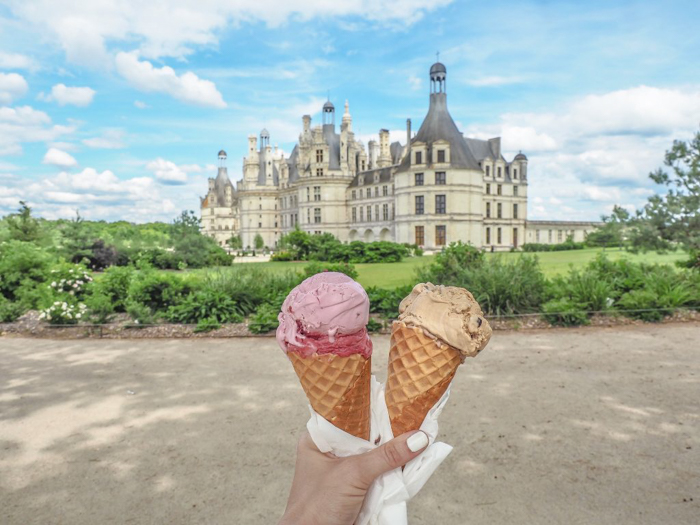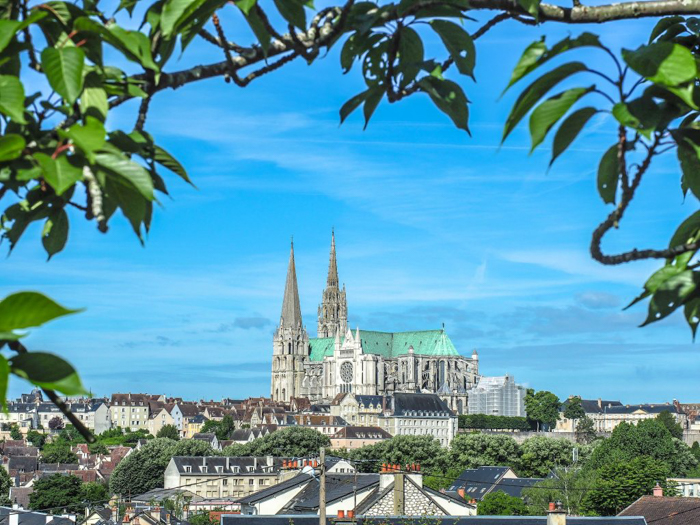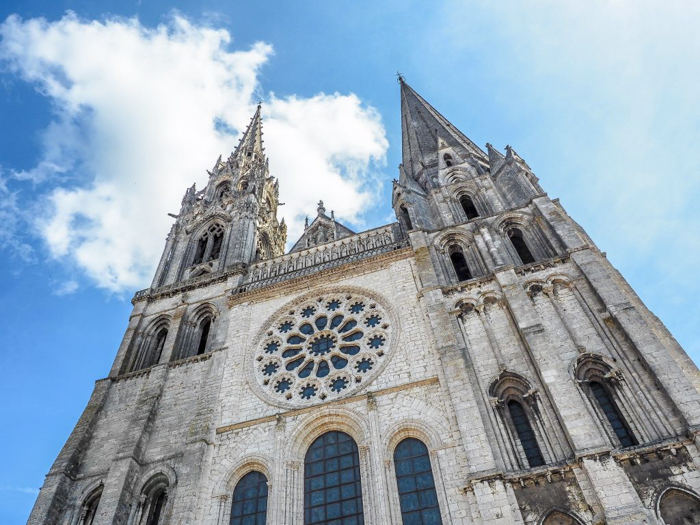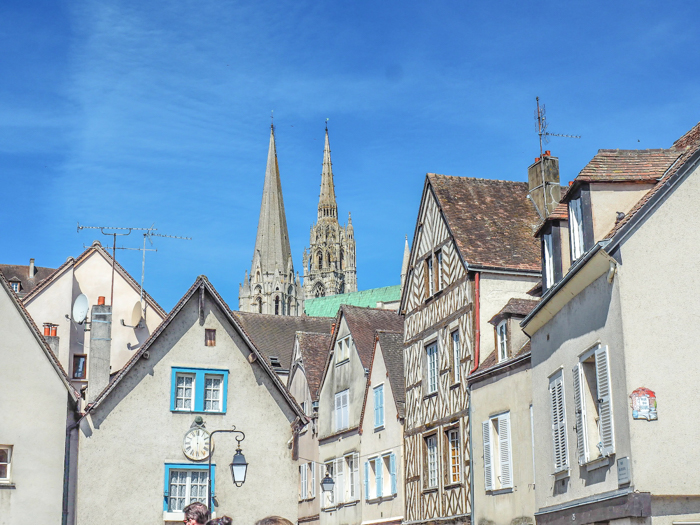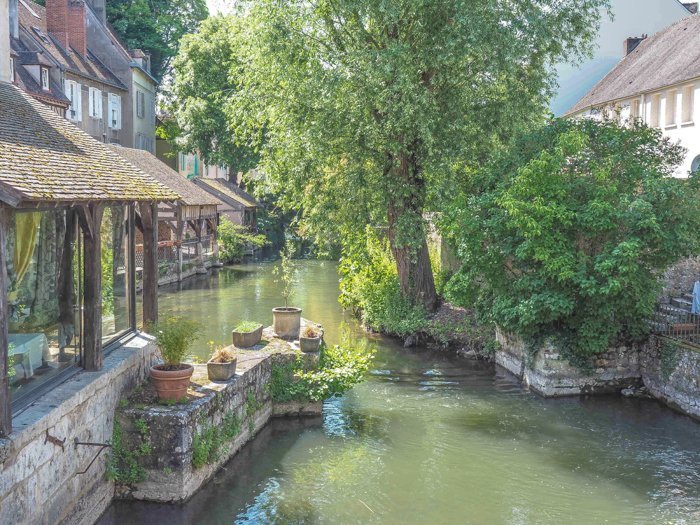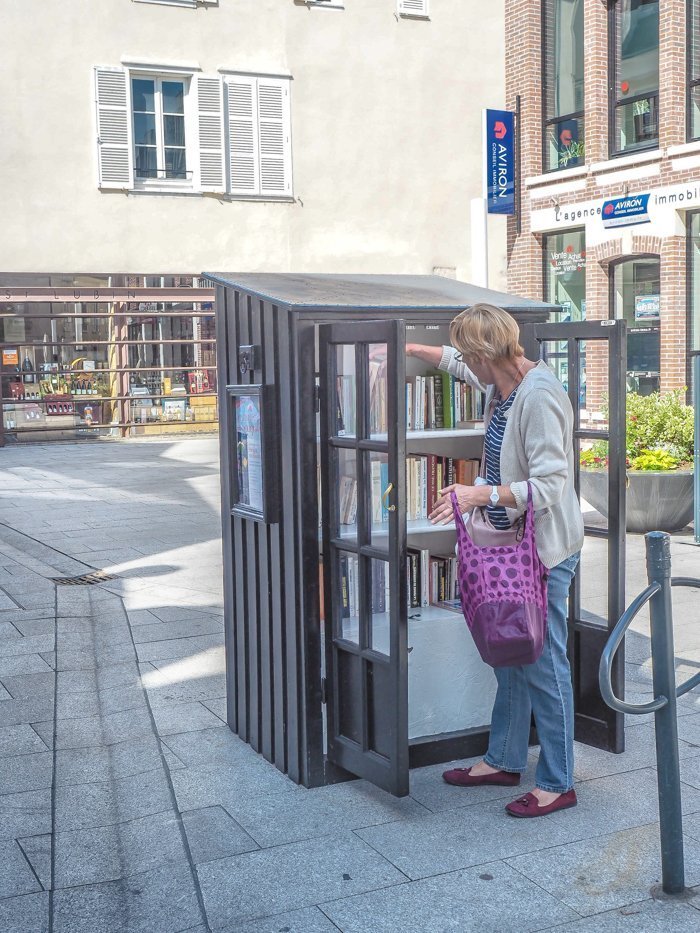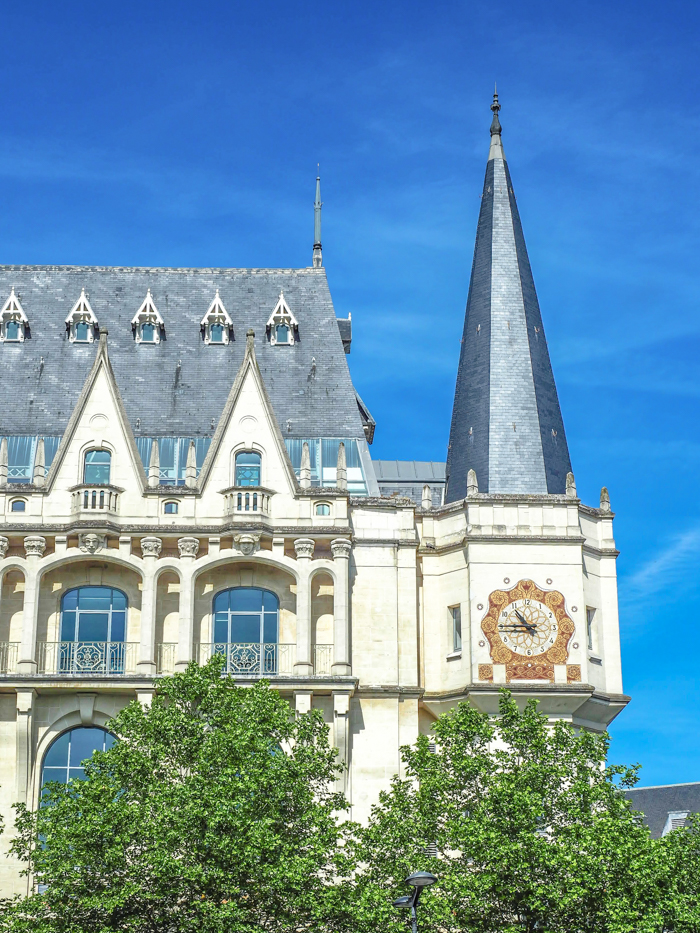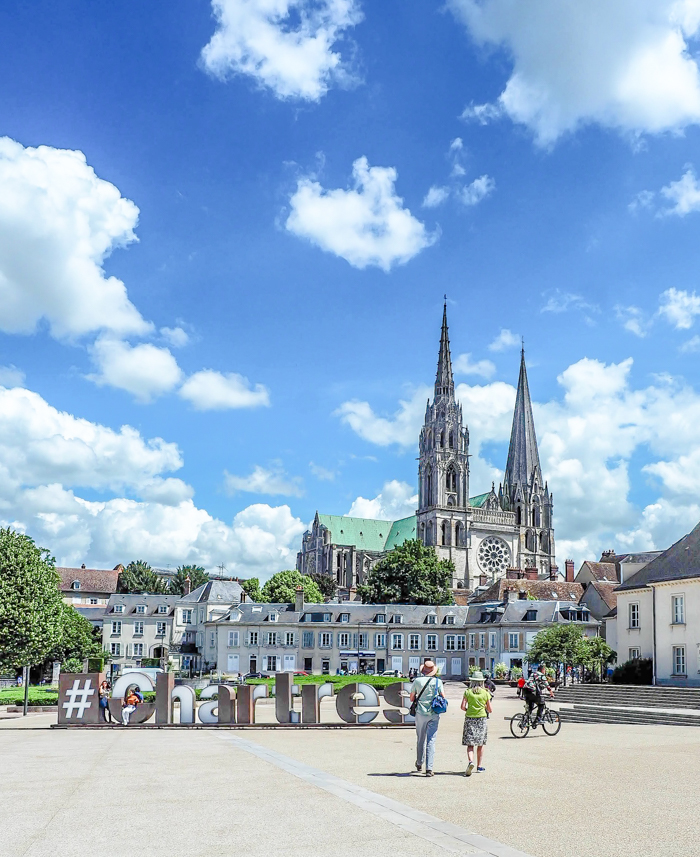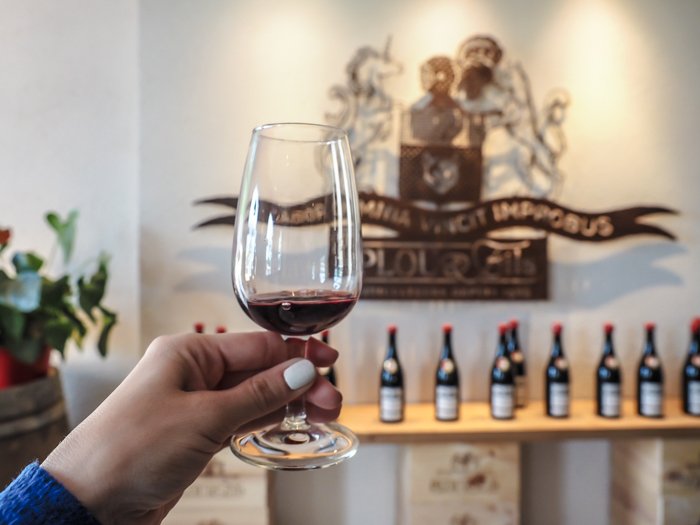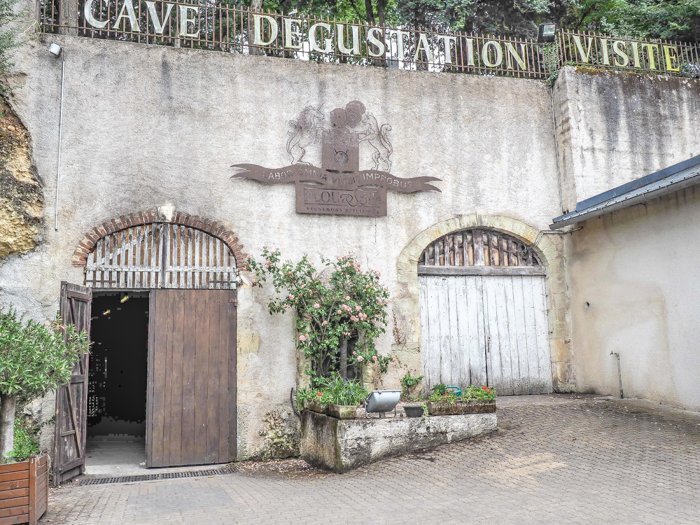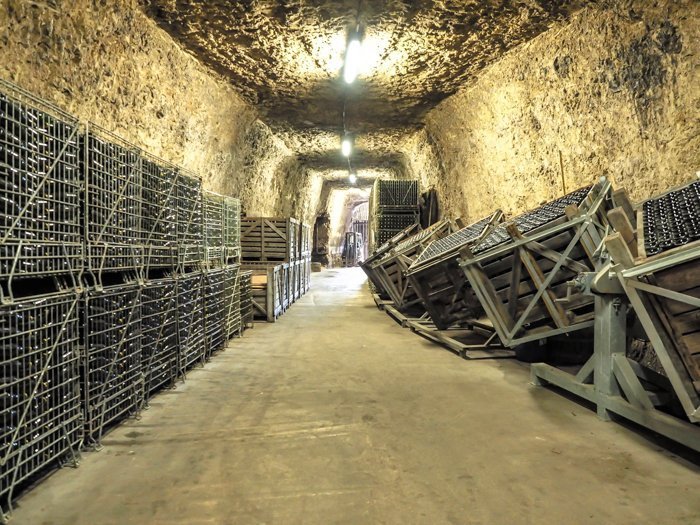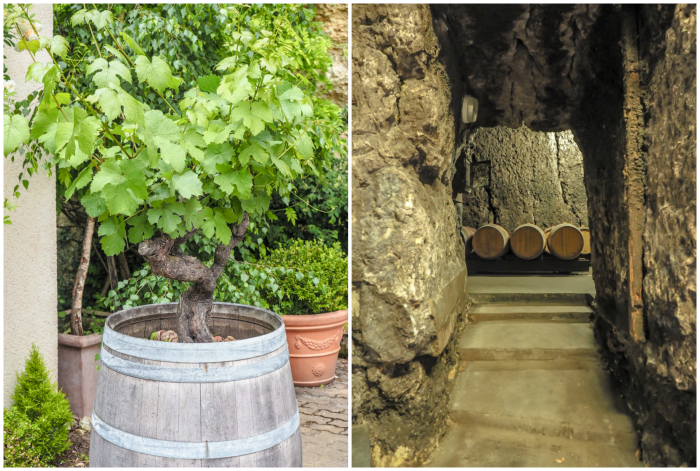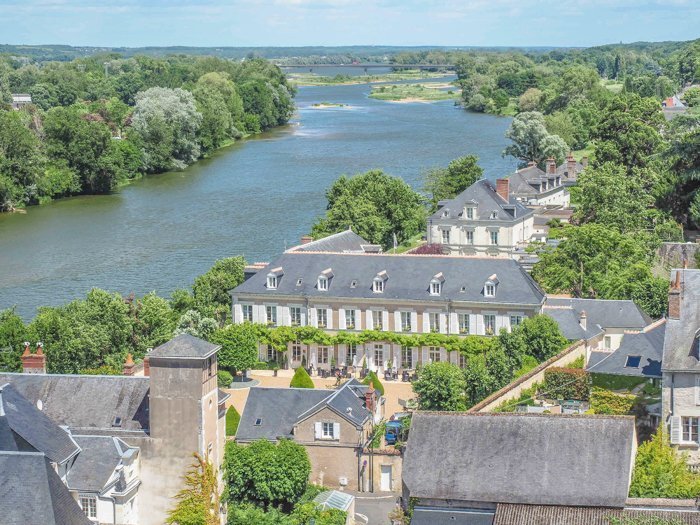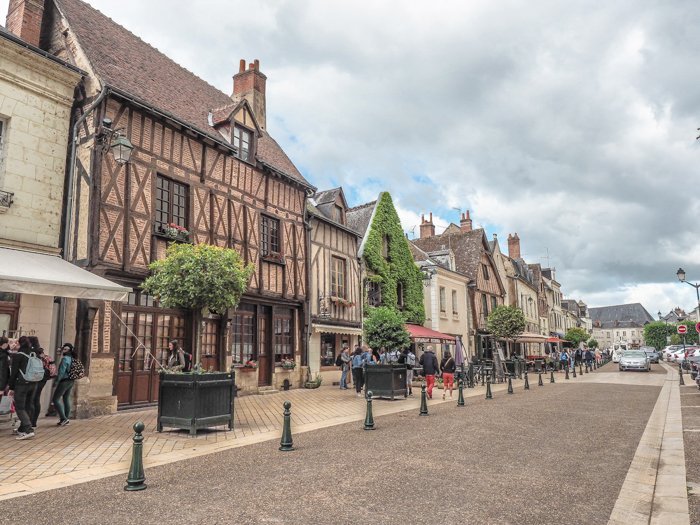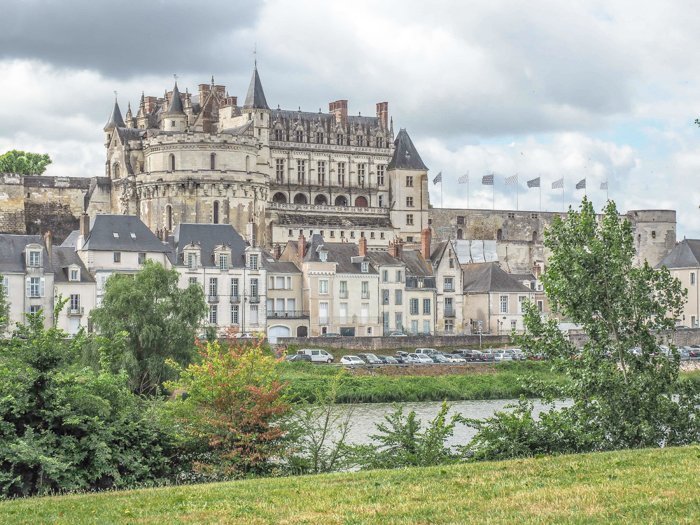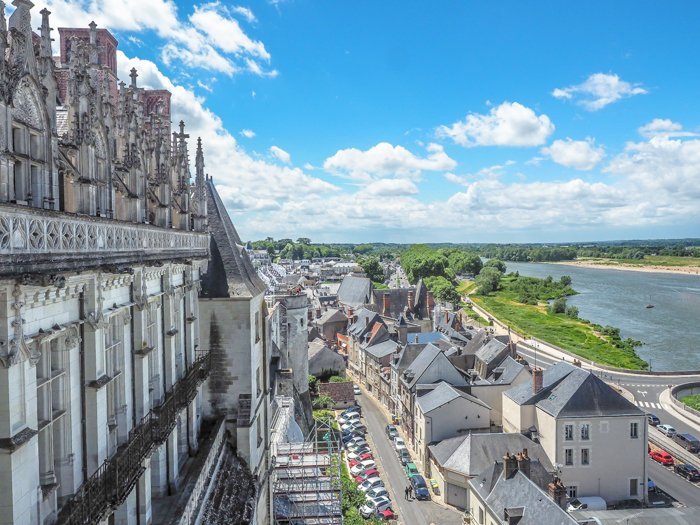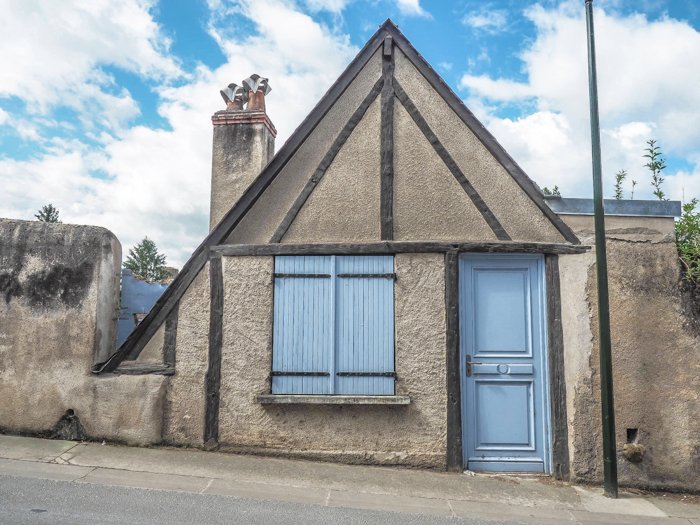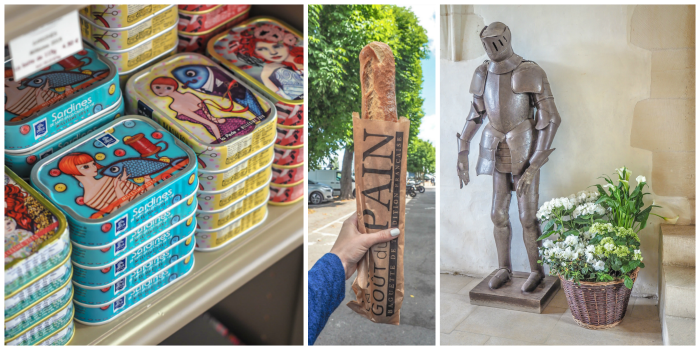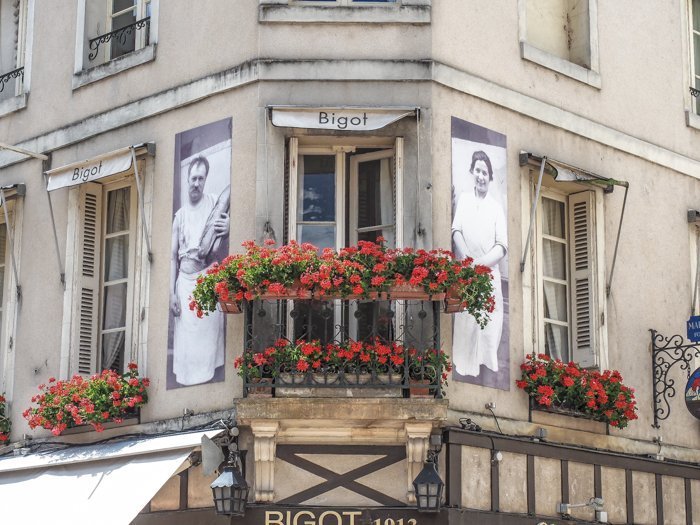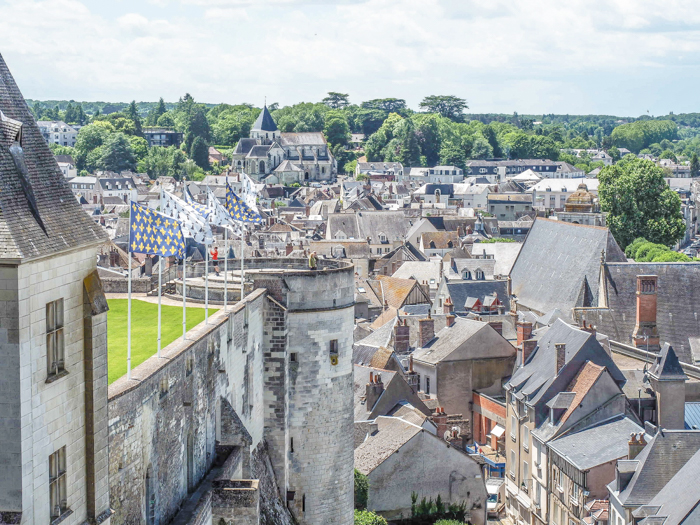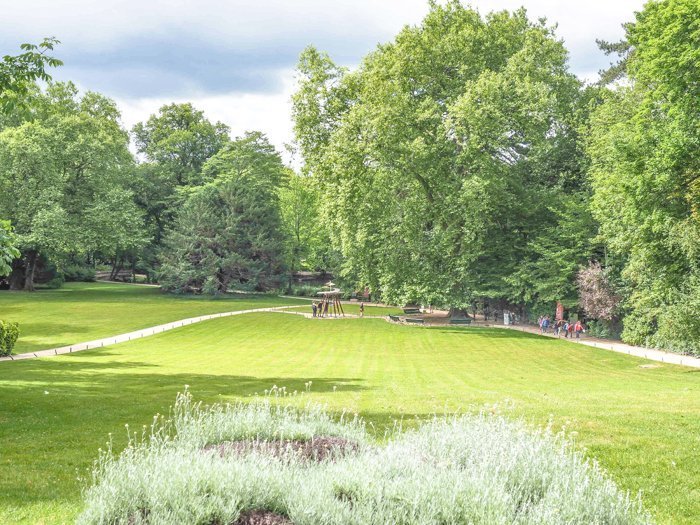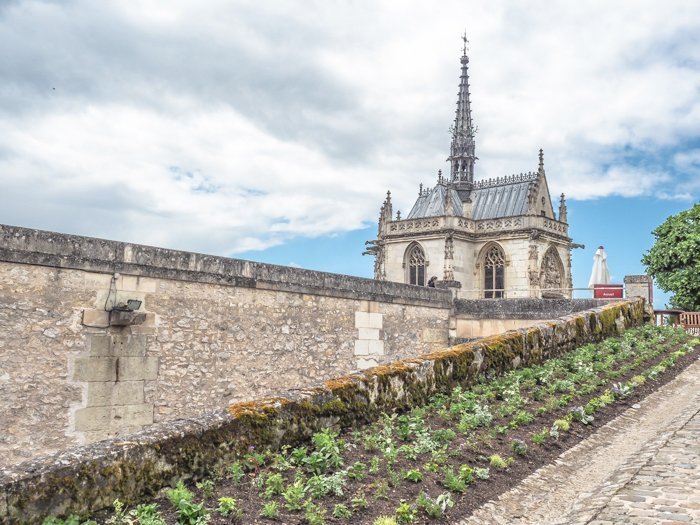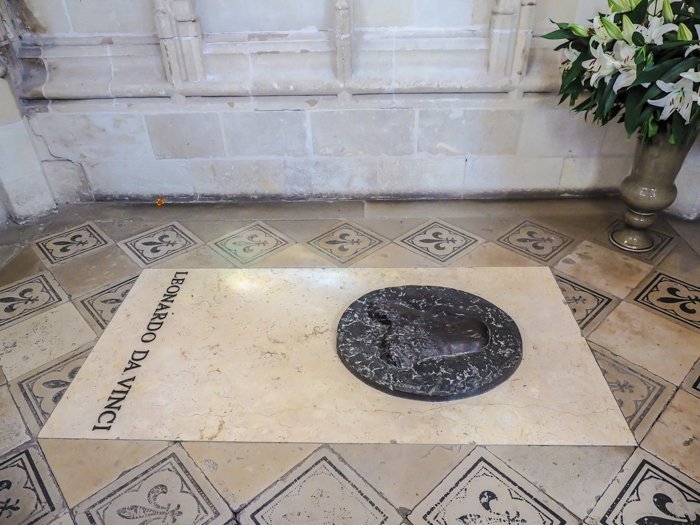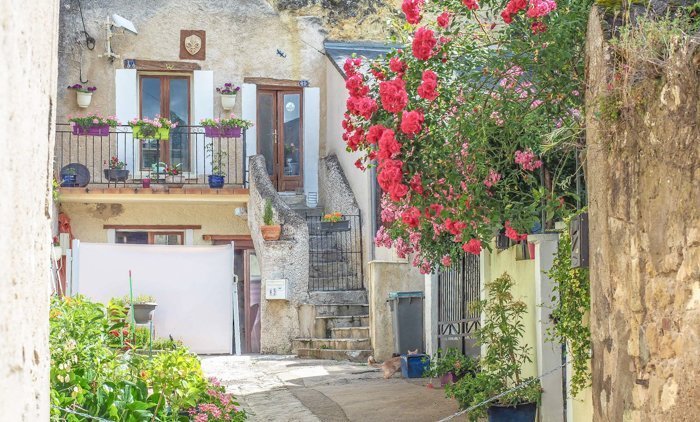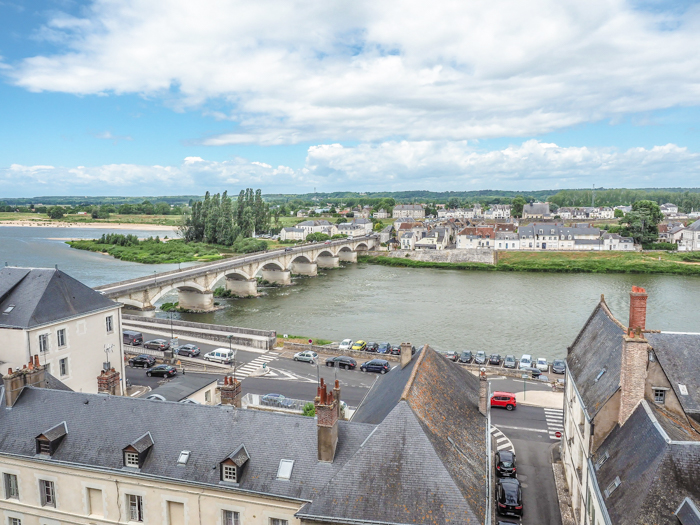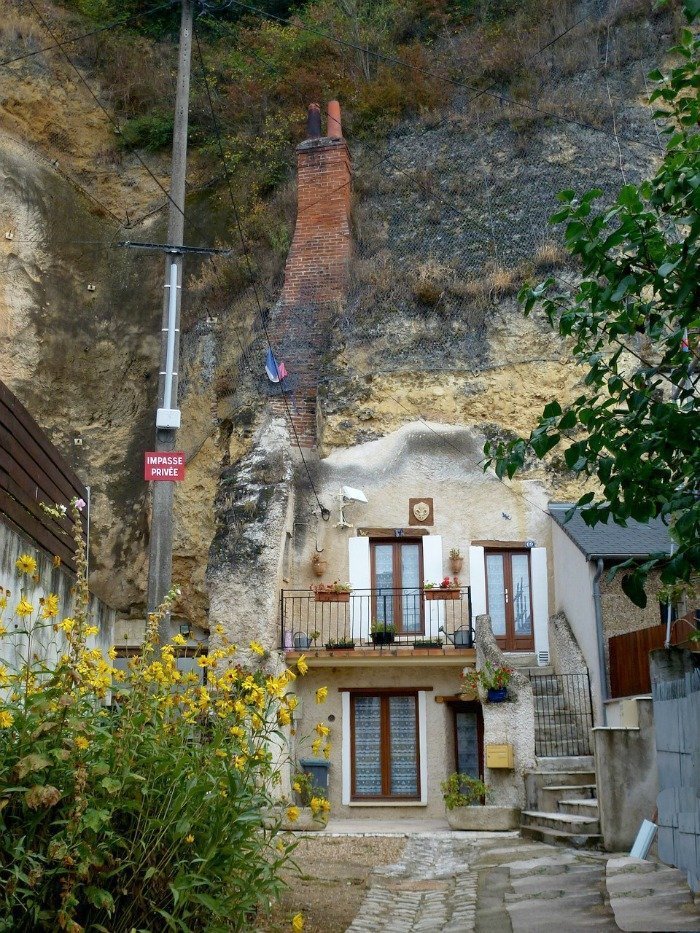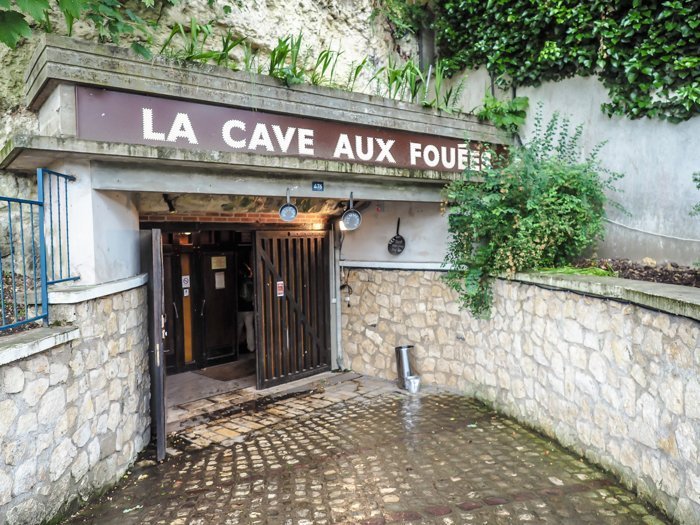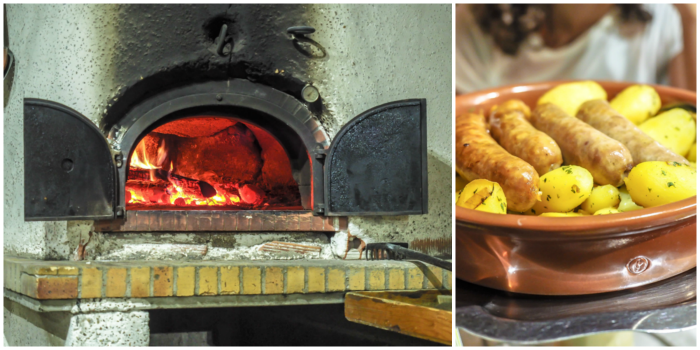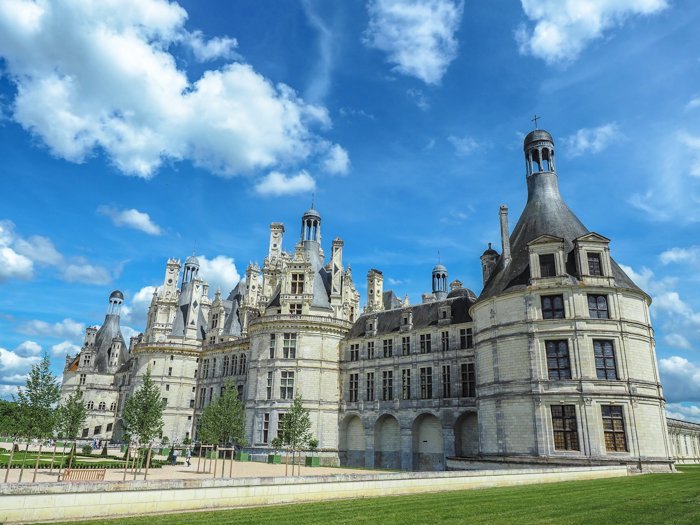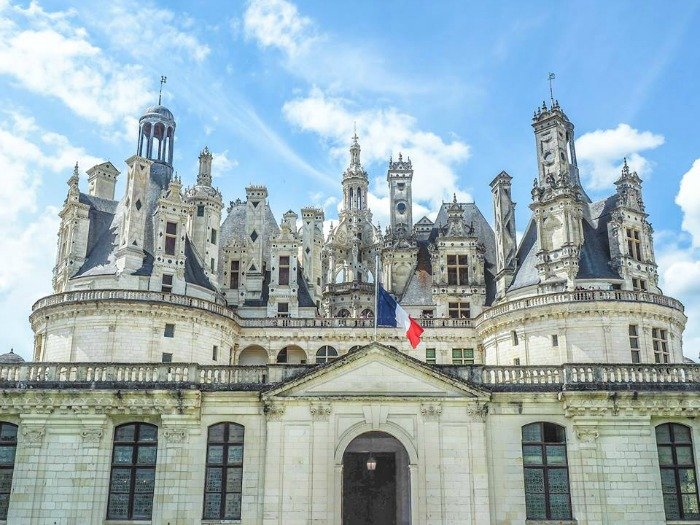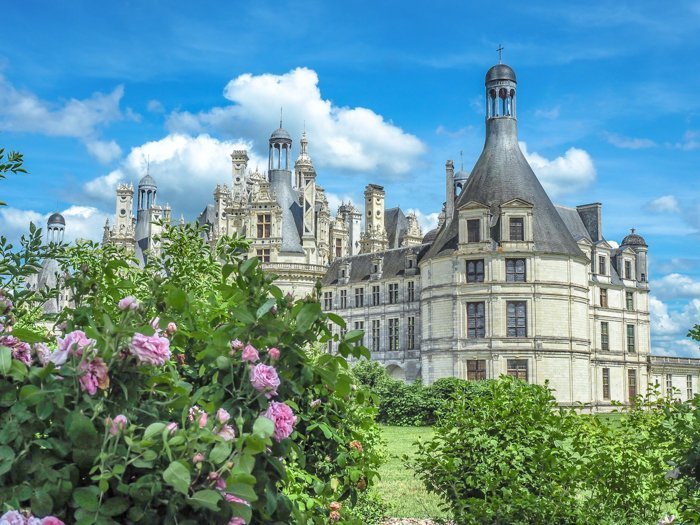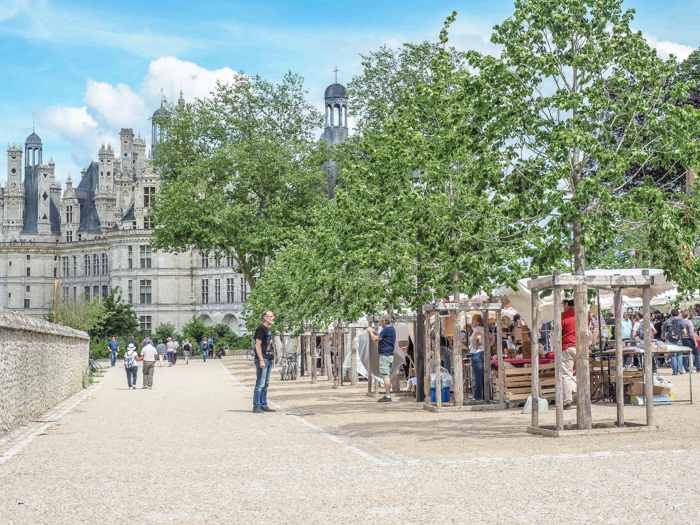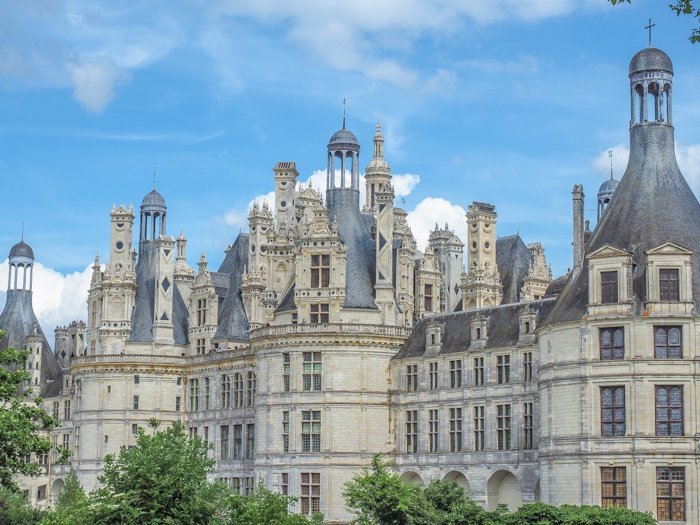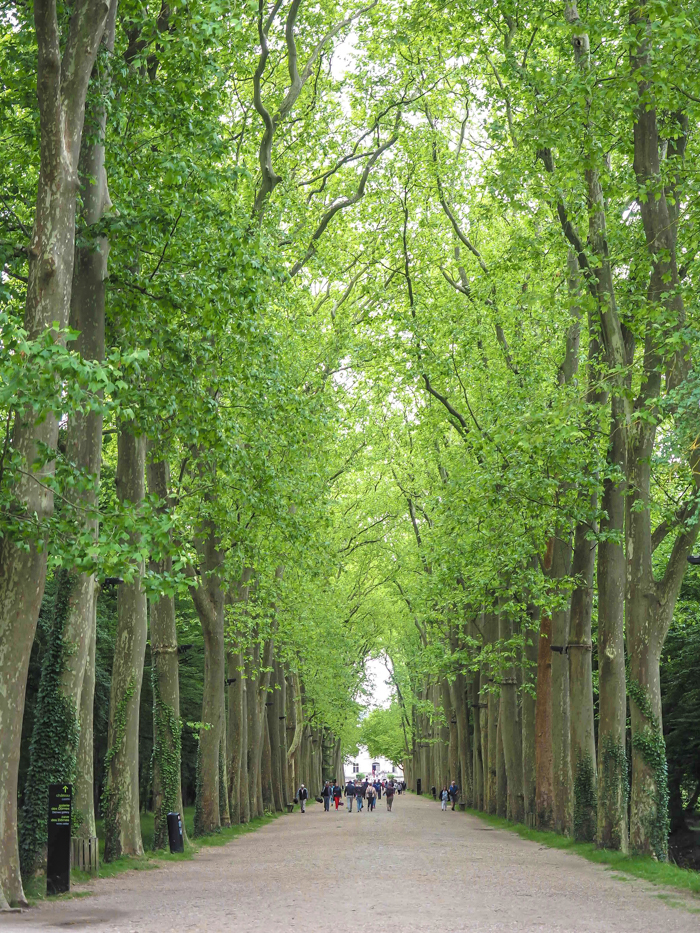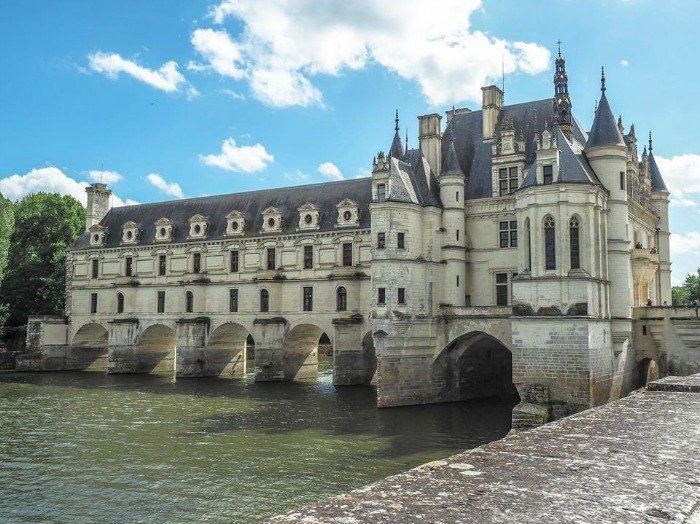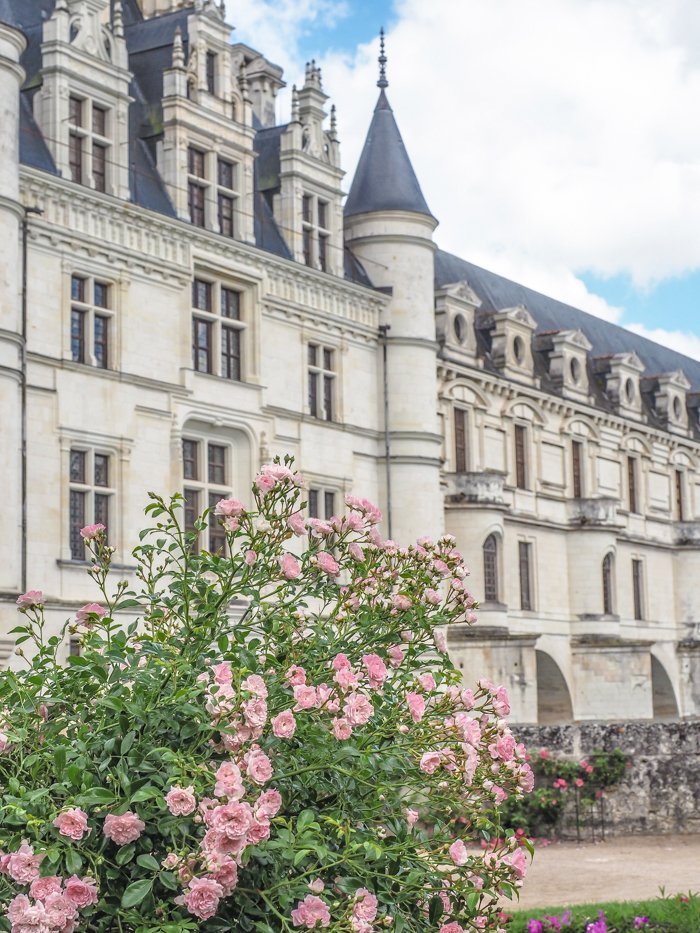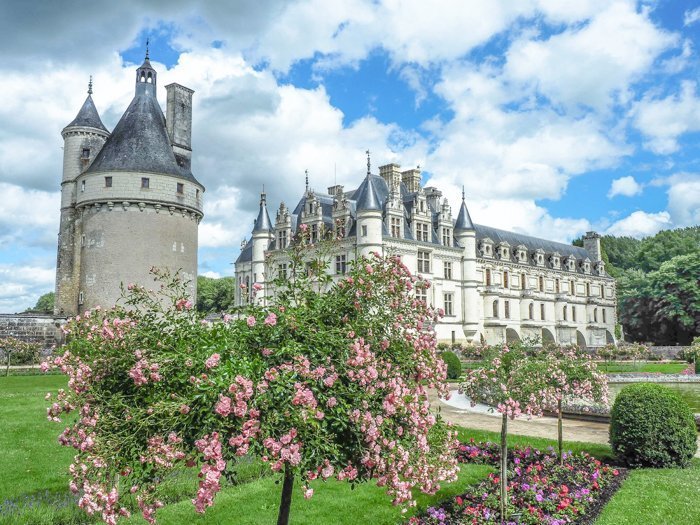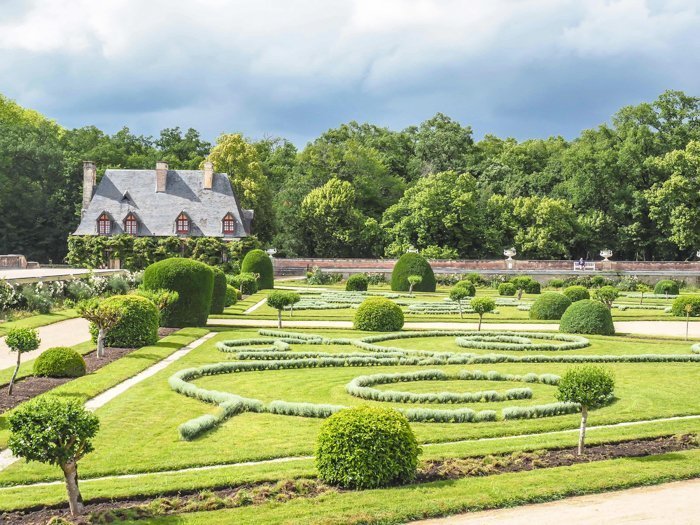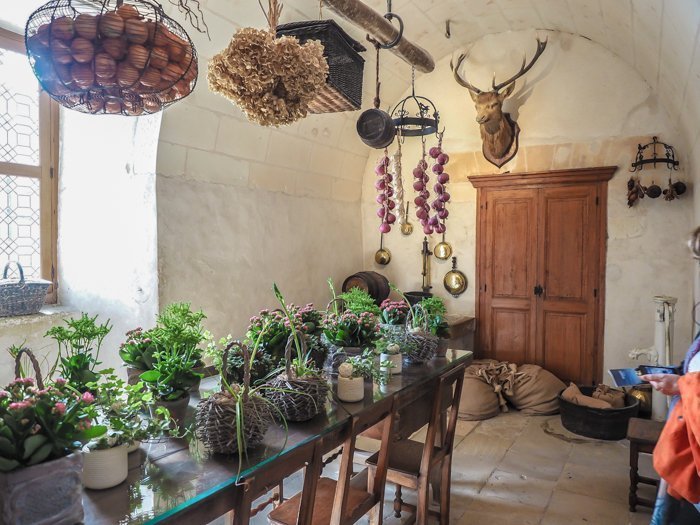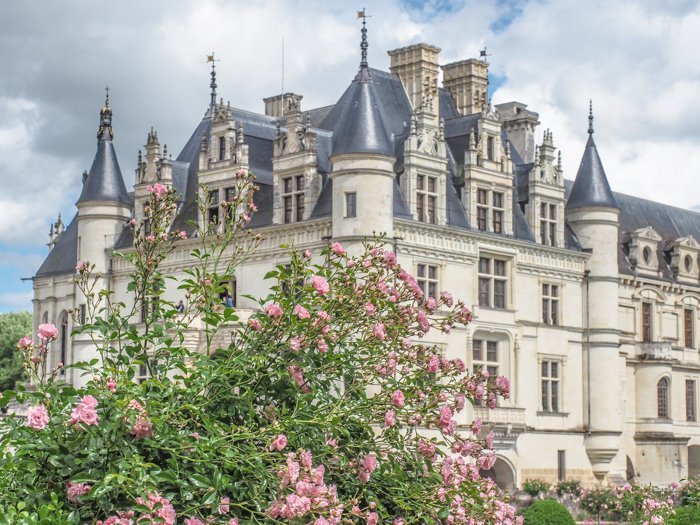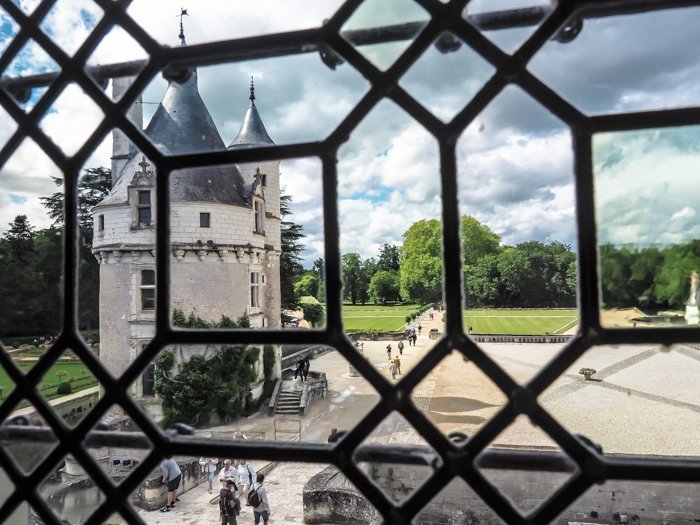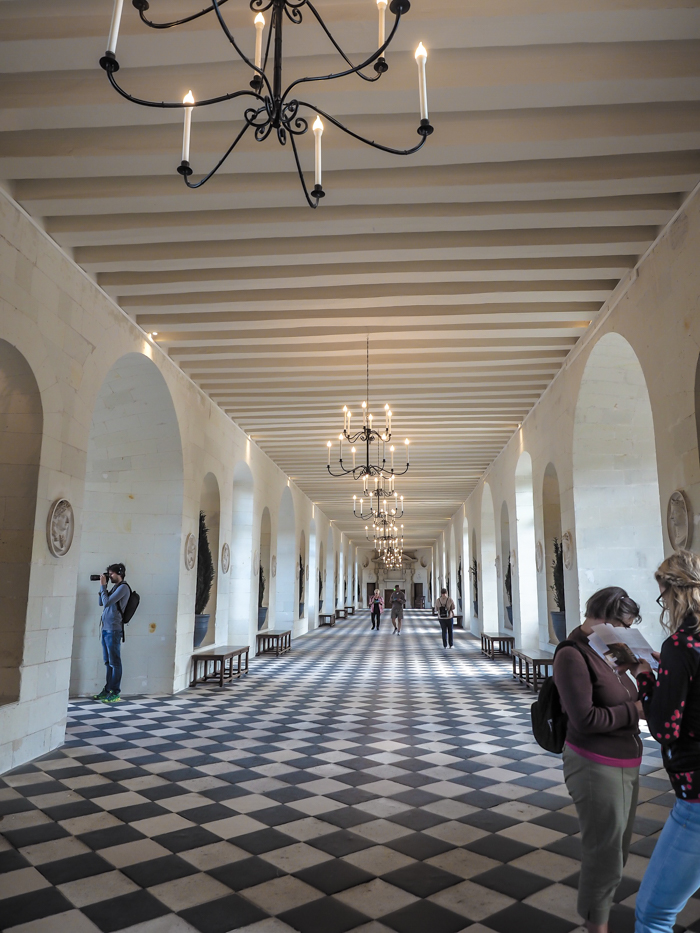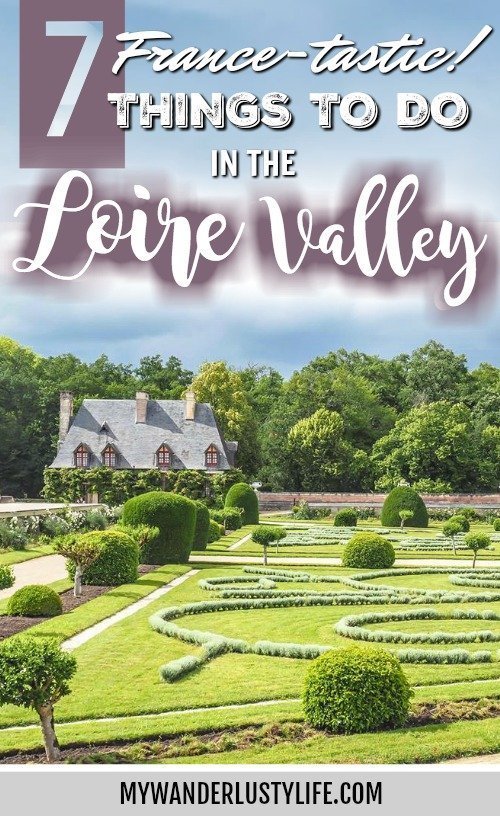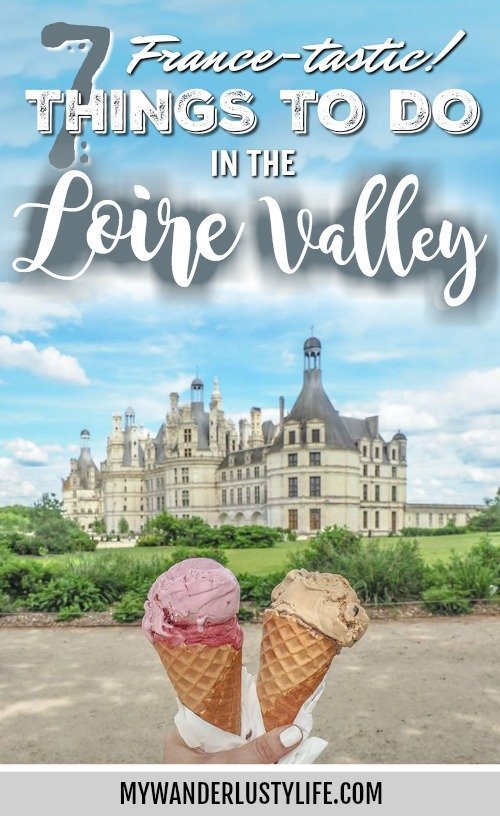When I first started looking up things to do in the Loire Valley, my first thought was, “WTF!”– as in, way too feminine! Castles? Wine? I assume there’s going to be a fairy godmother and a glass slipper at some point?
Had my travels finally turned me into a Disney princess? The holes in my Converse gave me quick “No, child!” But maybe I was just the before version–the one that sweeps a lot and talks to the mice she shares her home with? Or, since this trip does include dinner in a cave, the situation was looking a lot more Fiona than Aurora.
France’s Loire Valley is the lush area surrounding the 170-mile center portion of the Loire River in Central France. And when I say lush, I really mean opulent castles grow here like weeds. Also, grapes–because a princess has to get her buzz on, obviously.
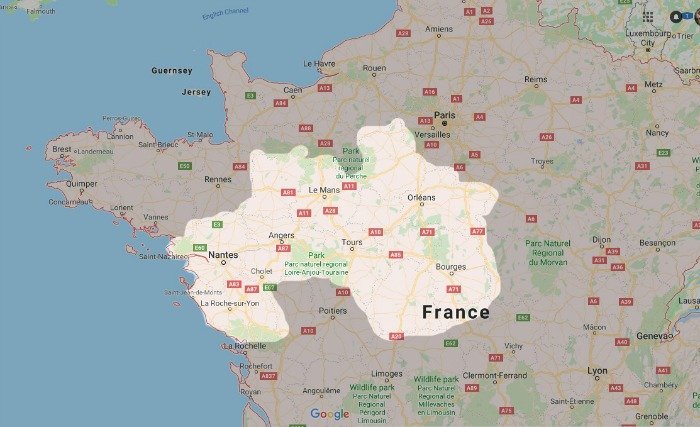
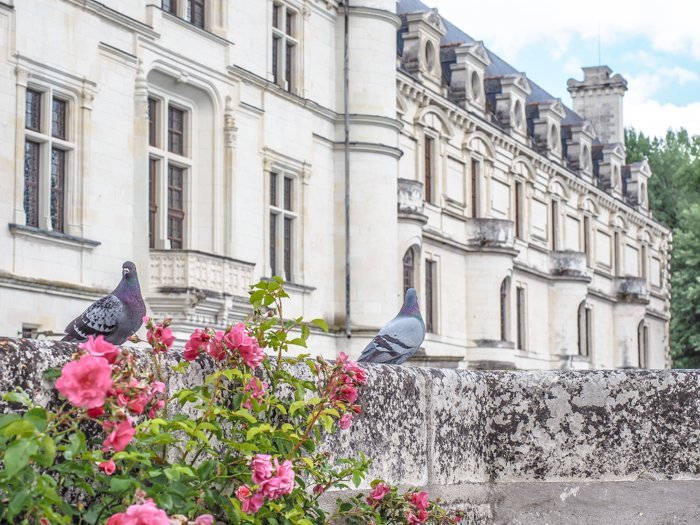
Things to do in the Loire Valley, France
You’ll find there are many things to do in the Loire Valley–but, let’s be real, most of them have to do with castles. France’s Loire Valley is actually home to, I kid you not, more than 300 fancy châteaux. In a 310 sq. mile piece of Europe. That hardly leaves any room for an Enchanted Forest, right?
So because this post isn’t titled “300+ Fancy Things to Do in the Loire Valley,” I’ve chosen a few of my favorites as well as a handful of other must-see sites and must-drink beverages.
France’s Loire Valley is an almost surreal destination that’s fit for both princesses and, yes, even bloggers who don’t change out of their pajamas for three straight days -aka- ogres.
1. Visit Chartres and its cathedral
The town of Chartres (pronounced Charblar blar zzz — French is impossible) is located just 60 miles southwest of Paris and is world famous for its cathedral — Cathédrale Notre-Dame de Chartres. A visit to Chartres makes a great day trip from Paris and/or a great start to your tour of the Loire Valley.
Chartres Cathedral
As is most of the Loire Valley actually, Chartres Cathedral is designated as a UNESCO World Heritage Site, representing not only “the high point of French Gothic art” but also “a Disney princess would totally get married here.” And it’d probably be Cinderella; she was the fanciest.
Chartres Cathedral–ground broken in the year 1205–is famous for being one of the most well-preserved Gothic cathedrals in Europe. Most of its stained glass windows are original and feature a special blue color that, apparently, just magically appeared.
A gazillion years later and no one knows how it was made or has yet to replicate it. It even has a name: bleu de Chartres–okay, not all that original for a color that’s one-of-a-kind. Why not Bibbidi Bobbidi Bleu?
The cathedral recently underwent a super controversial renovation (basically, they cleaned 800 years worth of dirt and grime off the interior surfaces and everyone lost their minds — I’m still undecided on my stance) and has never looked so fresh and so clean. Like ever.
The Cathédrale Notre-Dame de Chartres is home to one of the most important religious relics out there–the Sancta Camisa, otherwise known as a piece of cloth believed to be the tunic worn by the Virgin Mary on the night of Christ’s birth. Because of this and many other reasons, Chartres and its cathedral have become a well known pilgrimage destination. On the day of my visit, a group of children were arriving after their 3-day trek from Paris.
You might like
─
If you’re looking for more great day trips from Paris, be sure to check out my post on a day trip to Giverny–the home, gardens, and waterlily pond of Claude Monet. You can tour the entire property and see where he painted his most famous works.
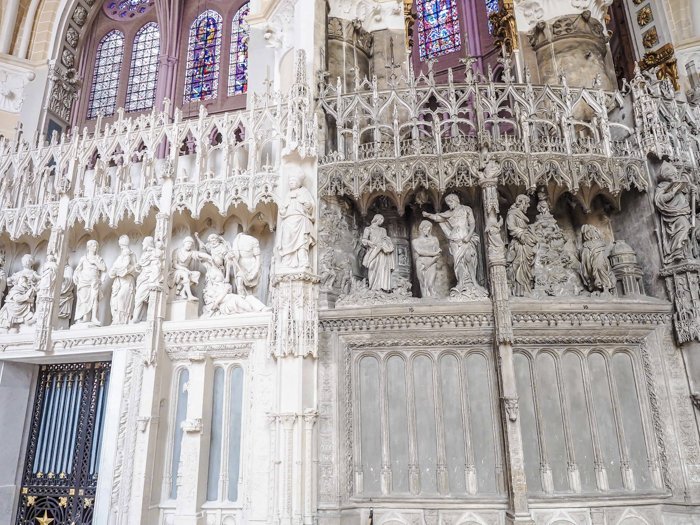
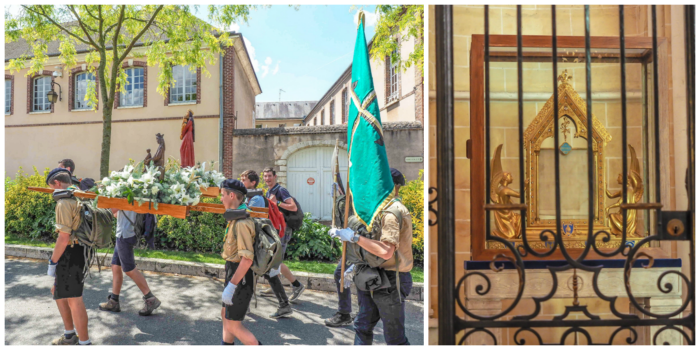
Chartres Museums
- Chartres most popular museum is the Museé des Beaux Arts, a fine art museum located in the former Bishop’s palace.
- There’s also Le Centre international du vitrail, a workshop/museum dedicated to the art of stained glass (don’t expect to learn where bleu comes from though);
- Le Compa, an agriculture museum because vineyards;
- Le Grenier de l’Histoire, showcasing historical military weapons and costumes. I’m only imagining the outfits Prince Charming wears here and nothing else.
Chartres walking tour
Chartres, France is more charming than Chris Hemsworth in, well, just any movie he’s ever done. Every talk show appearance too for that matter. OMG remember when he played a receptionist in Ghostbusters? Adorable.
Anyway, Chartres is like Chris Hemsworth in Ghostbusters. It’s simple, beautiful in an understated way, and just puts a smile on your face and a flutter in your chest.
Take some time to just walk around the half-timbered town and take it all in. You’ll see adorable little street libraries, an old washing station along the river, friendly felines, and Europe’s most well-preserved church from about a hundred different angles.
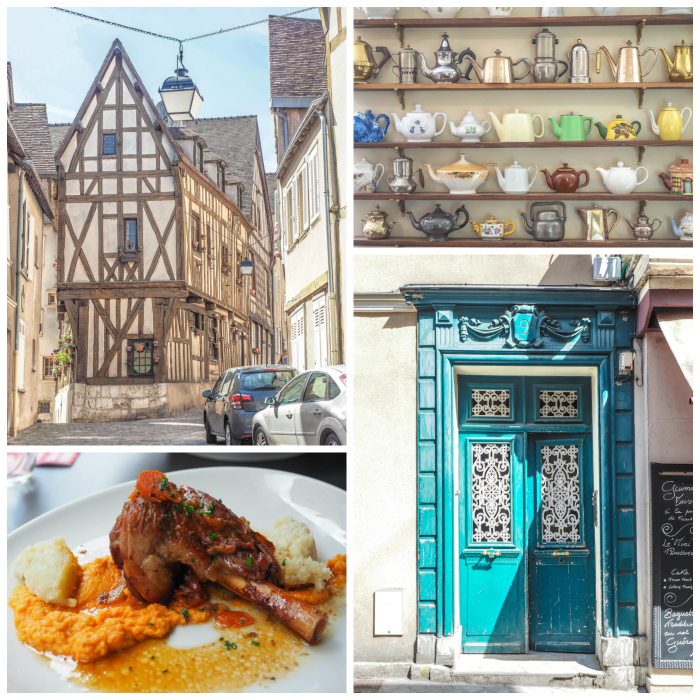
Lunch in Chartres
Just next to Chartres Cathedral is Rue des Changes where you’ll find many little shops and eateries.
My choice: Café des Arts where I had a fabulous lamb lunch at a street-side table. Follow that up with a cappuccino at Le Café Serpente across the street because there are a lot of things to do in the Loire Valley and we’re just getting started. Princess Needsmorecaffeine, over and out.
Where to stay in Chartres
Le Jardin Cathedrale
This little bed and breakfast right outside Chartres Cathedral is almost too cozy to believe! Can I please live here? I’ll give up my tree stump in the swamp!
The place comes with phenomenal ratings, continental breakfast, church views, and I’m guessing your very own pumpkin carriage to ride around in. Read reviews on Tripadvisor then book your room here!
ibis Chartres Centre Cathedrale
Another adorable hotel yet on a more modern side. This one is just a 10-minute walk from the Cathedral and the bathrooms even have hair dryers! Europe score! Read reviews on Tripadvisor then book your room here!
Le Boeuf Couronné
The name translates to “Crowned Beef” so if this place isn’t meant for you, I don’t know what is. Just look at the photos–so dreamy! This is one of Booking.com’s best selling hotels in Chartres and I can see why–those views! Read reviews on Tripadvisor then book your room here!
Optional tours in Chartres, France
- At the Chartres tourism office (just a couple blocks from the cathedral) you can pick up a walking map of the city and get advice on routes to take.
- For tours of the cathedral, head to their visitor page.
Suggested Reading for Chartres
Chartres Cathedral by Malcolm Miller
Obviously the guy who knows more about Chartres Cathedral than anyone wrote a book about it. He teaches you about the history of the cathedral, medieval art, and how to “read” the stained glass windows. But does he know how to make bleu? Hmm…
The Cleaner of Chartres by Salley Vickers
This one is a novel set in the little town of Chartres where the main character is a not-so-controversial cleaner of the cathedral. Apparently, all is well and good until something mysterious happens! Dun dun dunnnn.
2. Go wine tasting
You can’t visit the Loire Valley and not go wine tasting. It’s one of the most popular things to do in the Loire Valley. That would be like going to Mexico and not eating tacos. Unheard of.
France’s Loire Valley is one of the world’s top wine producing regions and it’s your duty to sample the goods. Let’s toast to the old gods and the new!
Allegedly, archaeological evidence suggests the Romans planted the first vineyards in the Loire Valley in the 1st century AD – but who really knows, right? Actually, I feel like Malcolm Miller probably does.
What kind of wine to drink in the Loire Valley
The Loire Valley is mostly known for its white wines (your Chenin and Sauvignon Blancs) and is actually the second largest producer of sparkling wine just after Champagne (the region).
Within the Loire Valley wine region are separate, individual wine regions with names like Sancerre, Muscadet, Chinon, Vouvray, and the very French-sounding Pouilly-Fumé.
But when you’re familiar with only Réd and Whité, this all boils down to just a bunch of nonsense. Ergo, you must taste them all to (attempt to) understand and look well-traveled amongst your peers back home.
The Loire Valley tourism site has a 12-page list of wine cellars and tastings available to tourists so your choices are many. The one I went to is on page 7.
Plou et Fils tour and wine tasting
At Plou & Fils we were given a full tour of the facility including the wine caves and the production and bottling lines; we learned about grapes and climate; and, most importantly, we got to sample every single one. Nothing but the best for Princess Needsmorebooze!
Available to you, 100% free of charge during your visit is:
- 1.5 hour self-guided tour of the vineyard
- 20-minute guided tour of the wine cellars
- Wine tasting – They have 16 different kinds. There’s even one called “Milady” which obviously is my favorite.
3. Spend a day in Amboise
Okay, France’s Loire Valley is plentiful in many things–castles, wine, unpronounceable words, but also: quaint, half-timbered towns that don’t even seen real. The town of Amboise is another one of those.
When you reach Amboise, you’ll be right up against the Loire River. The Loire Valley is great and all, but the Loire River is pretty cool too.
Not only is it France’s longest river, but it’s completely wild–as in, no part of it is developed. To call the river “wild” means no part of it is dammed, contained within cement walls, and that it sometimes dances on tables at bars when “its jam” comes on. (Must be all that wine.)
Amboise Castle (Château d’Amboise)
Amboise Castle is absolutely massive and located high on a hill overlooking that floozy of a river. It was built on the foundations of an old fortress and is famous as being the once home of the French royal court.
Over time it has been a luxury palace, all but abandoned, used as a prison, visited by Joan of Arc, mostly demolished, confiscated by the government, and, now, is visited by tons upon tons of tourists each year.
Unlike many of the other châteaux you’ll visit in the Loire Valley, Château d’Amboise is unique in that it’s smack in the middle of the city–not surrounded by miles of countryside and donkey farms (I’ll get to that in a minute).
You can pick up your Amboise Castle + Gardens admission ticket here.
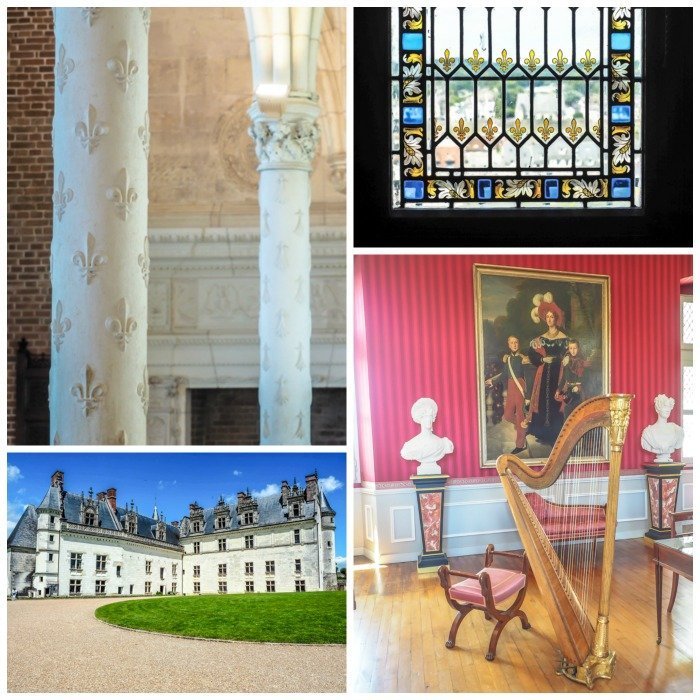
Medieval charm
The town of Amboise is charmingly unmodernized and you’ll get the feeling you’ve gone back in time. Just like in Chartres, spend some time roaming the streets and alleyways.
There are many lovely places to grab lunch (look, if the Loire Valley is WTF, I’m going to use words like ‘lovely’), a gelato, and, surprise!, more wine.
But the most popular thing to do in Amboise is to…
4. Connect with Leonardo da Vinci
Hold the device that’s the 15th century precursor to the phone! Wasn’t Leonardo da Vinci all about Italy? Turns out the Renaissance genius was all over Italy… and beyond.
Though he spent most of his life in Florence, Milan, and a little bit in Venice, the last part of his life was spent in Amboise, France.
In 1516, the King of France invited Da Vinci to come work for him at Château d’Amboise as his personal painter, engineer, architect, and all-around Renaissance badass.
He accepted and moved into a nearby château of his own where he spent the last three years of his life. While visiting Amboise, you can connect with Leonardo da Vinci at:
Le Clos Lucé
Le Clos Lucé is the “small” château where Leonardo da Vinci lived and worked while in Amboise.
Today, the preserved inside has been turned into a sort of Leonardo da Vinci museum where you can tour the rooms he used to call maison.
You can visit his workshops, the library, the basement, and even his private bedchamber which is just a fancy French word for ‘digs’.
Outside the château is the Leonardo da Vinci Park and Gardens. It’s part beautiful French garden, blah blah, and part filled with life-size models of Leonardo’s inventions you can totally climb on–all crafted using his exact specifications.
You can pick up your Clos Lucé + parks admission tickets here.
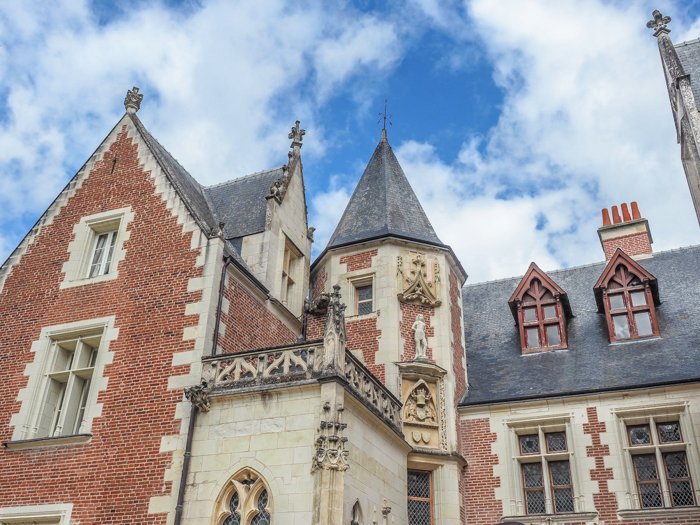
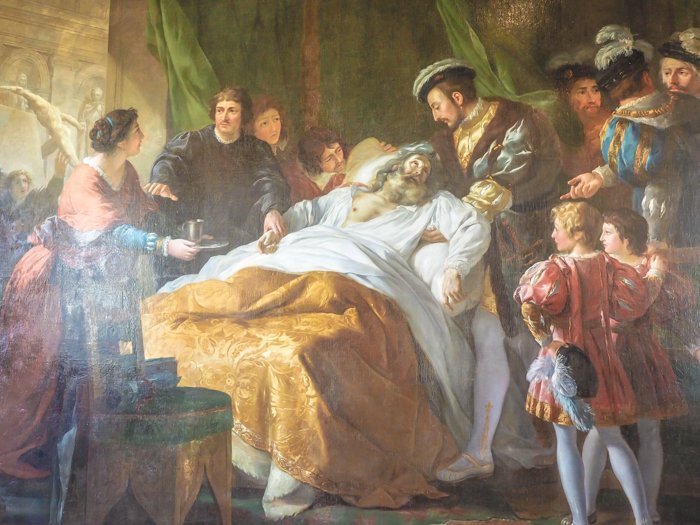
Chapel of Saint Hubert
Back at Amboise Castle you’ll have the chance to visit the Chapel of Saint Hubert – Leonardo’s actual last residence. Because he’s buried there.
Where to stay in Amboise
The Originals Amboise Chaptal
This is the best selling hotel in Amboise and it looks about as cozy as your own home. It’s got great reviews, a “very good” breakfast, and is within walking distance of everything you need to see in Amboise. Read reviews on Tripadvisor then book your room here!
Hotel Bellevue
Hotel Bellevue is located just behind Amboise Castle and has views for days from its terrace. The price is more than reasonable and the location can’t be beat. Read reviews on Tripadvisor then book your room here!
Le Clos d’Amboise
If you’re into splurging while experiencing all the things to do in the Loire Valley, this place is toight and super French. There’s even a pool – when was the last time you saw a hotel with a pool in Europe? One rule though, you must put your pinky up when drinking at all times. Read reviews on Tripadvisor then book your room here!
Optional tours in Amboise
This E-bike tour of Amboise, Clos Lucé, and Loire vineyards looks super fun! This 5.5-hour tour sounds like the perfect introduction to Amboise as it’s led by a knowledgable guide, covers so much ground, plus… there’s wine.
Suggested reading before visiting Amboise
Leonardo da Vinci: The Amboise Connection by Pamela Shields
I imagine if you want to learn more about Leonardo da Vinci’s time in Amboise, this is probably the place to turn.
Leonardo and the Last Supper by Ross King.
If you’re interested in Leonardo da Vinci in general, this is one of my personal favorites. I talk more about it in my post on books to read before traveling to Italy.
Also check out
─
If you want to see more castles and beautiful sites in France, check out the magical Mont Saint-Michel. This gorgeous monastery on a hill becomes an island when the tide comes in. But, it’s not just a beautiful sight to behold, it’s actually totally worth visiting Mont Saint-Michel.
5. Have dinner in a troglodyte cave
We have now reached the Shrek portion of this program.
When I heard one of the things to do in the Loire Valley was to dine in a “troglodyte cave” I was like, “WTF?” — as in, where the T-Rex feeds?
Though it sounds like something from a more Jurassic time period, a troglodyte is actually a word describing a human cave dweller. I realize that explanation doesn’t really help. Look, just picture the living arrangements of the Flintstones and the Rubbles and you’ll get it. Here’s an example:
You see, all throughout France’s Loire Valley you’ll find homes built right there into the sides of slopes and rock faces. The rock material in this region is soft enough that you can just cut into the mountainside and post your family up.
What seems kind of bizarre actually makes perfect sense–these in-the-rock troglodyte dwellings maintain a constant year-round temperature. They’re cool in the summer and warm in the winter. They’re also, apparently, the perfect place to have dinner.
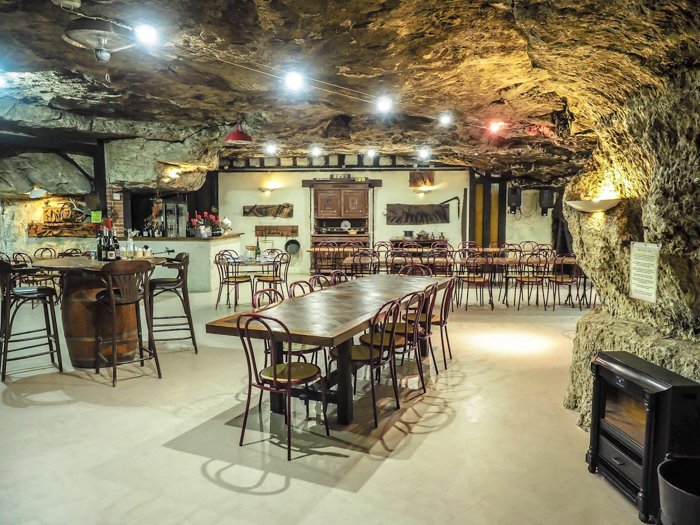
Also read: What it’s like dining at the famous Italy cave restaurant
La Cave aux Fouées
The food at La Cave aux Fouées is great, but the atmosphere is phenomenal. I promise, this is the fanciest cave you’ll ever have dinner in.
Dinner at La Cave aux Foueés is exactly what you’d expect to come out of a cave–a hearty meat and potatoes affair.
However, the highlight of your meal is going to be the all-you-can eat fouées, a small pocket bread baked in their special cave oven. You can watch them bake the bread that’s meant to be eaten straight out of the oven and stuffed with a traditional pork spread. Just stand at the oven and snatch basket after basket.
Having dinner in a troglodyte cave is definitely the Shrek in a world of Cinderellas but is a truly unique and unforgettable experience I highly recommend.
6. Check out Château Chambord
If anything in France’s Loire Valley is WTF, it’s definitely the whoa that’s fancy Château Chambord.
In the land of gaudy, freakishly huge châteaux, Château Chambord is the biggest and by far the gaudiest.
It was actually built as a mere hunting lodge, ho hum, for the king of France who ended up only spending a few weeks there TOTAL. This place is almost obscene in its opulence.
While most castles are built with a defense strategy in mind, châteaux on the other hand are purely ornamental cribs to make you look good in the face of your arch rivals.
Instead of fortifications, they come with manicured gardens, water features, and decorative aspects that have absolutely zero function. (Like year-round open windows. Umm haven’t you heard? Winter is coming!) Château Chambord is a textbook example.
Inside Château Chambord
One of the architectural highlights of Château Chambord is its double helix staircase supposedly designed by Leonardo da Vinci (like, they’re not 100% sure… but they believe it’s pretty likely).
It also features 83 more staircases, 800 sculpted columns, 11 kinds of towers, 3 kinds of chimneys, 440 rooms, and 282 fireplaces.
Apparently, when King Francis I commissioned its design, he wanted it to look like the skyline of Constantinople. Like what? Oh, lord, rich people…
You might like
─
If castles are high on your agenda, you should definitely consider visiting Neuschwanstein Castle in Germany, arguably one of the most famous and well recognized castles in Europe.
Take a tour of Château Chambord
While you’re welcome to just show up and lurk around the exterior of the property on your own, they also offer a variety of tours.
Unlike most castles you’ll visit in Europe, admission into Château Chambord gets you into a whopping 60 rooms that are open to the public. You can take a:
Self-guided tour
Includes a 20-minute introductory film, informational displays throughout the building, and a free visitor guide available in 14 languages (though a more detailed one can be purchased for 7 euros).
English guided tour
A professional guide takes you through the highlights of the château on a tour that lasts one hour. Guided tours are offered every day from July 1st to September 29th at 11:15 am and cost an extra 5 euros.
Tour with the HistoPad
The HistoPad is a fancy iPad that takes you on an immersive tour of Château Chambord–fancy château, fancy equipment.
It utilizes interactive maps, more than an hour of audible commentary, and even a treasure hunt for children grown ups because grown ups need magic too, dammit. The HistoPad tours last 1.5 hours and they can be rented for an extra €6.50.
Horse and bird of prey show at Château Chambord
According to the Chambord website, from April 28th through September 30th you can “rub shoulders with birds of prey and be immersed in the atmosphere of François’ court; his reign will have confided to you its secrets.” Whatever that means.
I didn’t see a live show but I did see the costumed horse riders galloping about in the château’s park and knew something was about to go down. However, I believe the show is part medieval jousting, part acrobatics, part pomp and circumstance, with a handful of owls and eagles thrown in for good measure.
What else to do at Château Chambord
There’s actually a ton of stuff to do at Château Chambord. In addition to just touring the castle you can:
- Take a boat ride in the castle’s canals
- Take a 45-minute horse-drawn carriage ride
- Rent a rosalie – which is basically half bicycle, half Flintstones car
- Rent a golf cart and scoot around the property
- Walk the property’s 14 miles of hiking and nature observation trails
- Shop and dine at the market between the château and the parking lot
- Attend one of the château’s fancy festivals
- Or just go for a swim in your coin-filled money vault. The backstroke should be your stroke of choice.
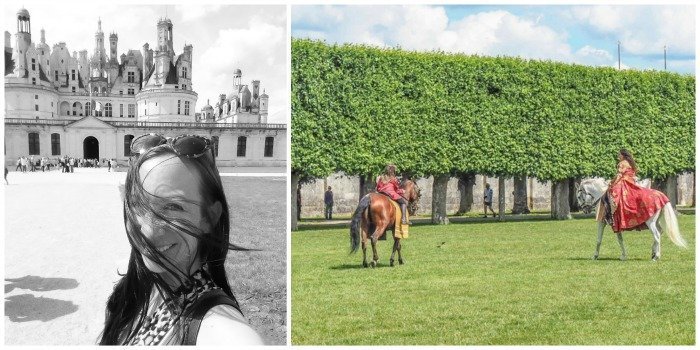
Where to stay near Château Chambord
La Maison d’à Côté
This place is so cute. And such a steal for a hotel that also has a Michelin starred restaurant inside. The bathtub next to the bed is a little strange though? I dunno, maybe that’s your thing. Bed baths. I can dig it. Read reviews on Tripadvisor then book your room here!
Hotel Le Saint Florent
A typical, quaint little European hotel but with a sauna, free Wifi, and on-site bike rental. Read reviews on Tripadvisor then book your room here!
Relais de Chambord
For when you’ve been inspired by the bored French king and feel like splurging. This place offers luggage storage and rooms with views of Château Chambord — I believe it’s the only hotel that does. Obviously, it’s the area’s best seller. Read reviews on Tripadvisor then book your room here!
Suggest Viewing
- This clip introducing you to Château Chambord from Rick Steves Europe
Save some money
─
If you’re starting your trip through the Loire Valley from France, definitely consider picking up a Paris Museum Pass to save some money and skip the lines. Read all about how I used mine during my 3 days in Paris.
7. Explore Château Chenonceau and its ground
Finally, we’ve reached Château Chenonceau, France’s most visited castle (just after the Palace of Versailles, that is) and my personal favorite.
The place dates back to the 11th century but the castle as you’ll see it today was built in the early 1500s. And since it was built on the foundations of an old mill, it has the unique attribute of having been constructed over the River Cher. A built-in moat is every realtor’s dream, no?
History of Château Chenonceau
At one time Château Chenonceau was owned by King Francis (the same guy who built Château Chambord for him and his little buddies to play in) but when he died Henry II came along, became king, and snatched it right up.
And, because I guess you can have too many castles to your name, he gave this one as a gift to his mistress Diane de Poitiers. To say life is unfair is the understatement of the 16th century.
Diane loved it, obviously, and built a bunch of pretty little gardens around it because what else is a royal mistress going to do with her time?
Well, in the freakiest of accidents, King Henry died after being impaled in the eye by a rogue splinter during a jousting match… while wearing the colors of his mistress Diane.
Finally, in a move I like to call “Mistress Managed,” Catherine de Medici (wife of King Henry) threw Diane de Poitiers out into the street (actually, it was into another, quite comfortable château) and built her own baller garden.
It’s no wonder this is the most visited château in France–it’s stupid pretty and seriously WTF (being that it’s a castle almost exclusively run by women throughout history). It’s without a doubt the most photogenic spot I visited on my tour of the Loire Valley.
The “dueling gardens” as I, and only I, call them are beautiful and well-kept, the location on the river is unique to Chenonceau, and the surrounding property is truly fairy tale magic.
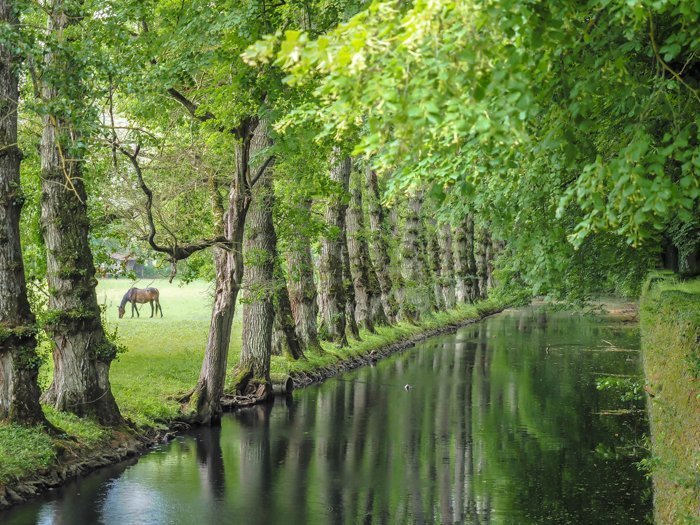
History is preserved
My favorite part about Château Chenonceau is that they maintain the interiors and keep them decorated as if the castle is still inhabited.
Rather than just show you a bunch of empty rooms where you’re forced to use your imagination to envision the past, here the place is set up as if it’s still in daily use.
The place is filled with fresh floral arrangements, the rooms are kept as they once were, and the kitchen appears as if it never stopped preparing probably super fancy meals.
The entire property is so dreamy
Your Chenonceau admission ticket grants you full access to the entire Chenonceau property. Besides the château, you can also visit:
- Both gardens – I’ll let you decide whether you’re #TeamDiane or #TeamCatherine.
- The hedge maze – Oh, rich people and their hedge mazes.
- The floral workshop and flower garden where all the flowers are grown for the château’s arrangements. (It’s way more than you think.)
- There’s an art gallery and a wine cellar
- also, a donkey park. It’s a castle with park full of donkeys. I *think* I’ve made my choice.
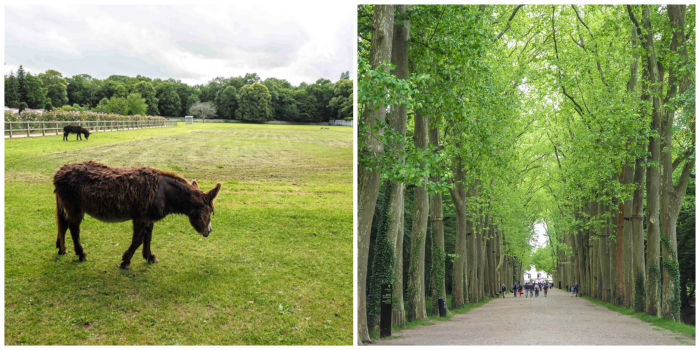
Where to stay near Chenonceau
Le Clos Médicis
I feel like any place I recommend after showing you Chenonceau is going to look like a garbage dump, but this bed and breakfast is pretty great. The rooms are modern and that outside area is stunning! Also, there’s a hot tub. Ashley is #TeamHotTub for sure. Read reviews on Tripadvisor then book your room here!
Hotel La Roseraie
This place is beautifully French and also with a gorgeous outdoor space (with a pool). Also, it’s within walking distance to Château Chenonceau. Read reviews on Tripadvisor then book your room here!
Hotel La Renaudière
This hotel is set in a 2.5-acre park of 200-year-old trees, in an 18th century manor, within walking distance of the château. This place is actually a steal. Read reviews on Tripadvisor then book your room here!
Optional tours in Chenonceau
- Château Chenonceau offers an audioguide for an additional few euros when booking your tickets.
Suggest viewing before visiting Château Chenonceau
- This clip describing Château Chenonceau from Rick Steves Europe
Additional tour options for all the things to do in the Loire Valley
If putting around the Loire Valley on your own doesn’t sound like a great time to you (shout out to all the world travelers out there who can’t drive a stick shift, woop woop!) there are other ways to experience all the things to do in the Loire Valley, with someone else behind the wheel. Here are a view guided tours I think you’ll like:
Small-group Tour to Chambord, Chenonceau, and Lunch at a Private Château, from Amboise – If you feel like just parking it in Amboise and letting someone else show you around the châteaux, this tour’s great. It has all 5-star reviews, lasts a whole 9.5 hours, and tops out at 8 people making this a virtually private tour.
Loire Valley Châteaux Day Trip from Paris – This 12-hour tour picks you up and drops you off in Paris, takes you to Chenonceau, the town of Amboise, Clos Lucé (Leonardo da Vinci’s house), Amboise Castle, and includes a wine tasting.
Châteaux + Wine Day Trip from Paris – This full day trip includes pick up and drop off in Paris, stops at Château Chambord, Château Chenonceau, a wine tasting at Nitray Vineyard, a gourmet lunch (they never include lunch!), and your own local guide. This tour has a 5-star rating after 572 reviews!
Suggest reading for the Loire Valley
- Fodor’s Essential France – Full France guidebook with a whole section focusing on things to do in the Loire Valley
- Lonely Planet Châteaux of the Loire Valley Road Trips – A travel guide full of tips on exploring the Loire Valley by car
- Rick Steves Snapshot: Loire Valley – All of the information on the Loire Valley taken from Rick Steves’ complete guide books
 Do you always visit castles when you can?
Do you always visit castles when you can?
Pin me ⇣⇣⇣

